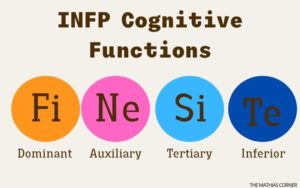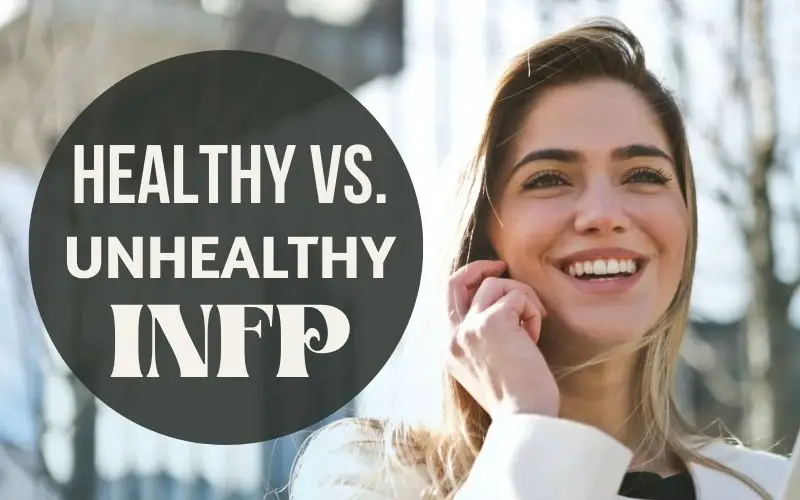“I led an honest, righteous, and dignified life as an INFP, but… I also realized I’ve been an unhealthy and immature one for most of my life.”
INFPs can be either encouraging or destructive at some point. Yes, INFPs may follow the same thought processes, but we’re still individuals with different goals, decisions, and ideals. So, in this post, we’ll tackle:
- the differences between the Unhealthy VS. Healthy INFP
- how to be a healthy INFP?
Anyone familiar with Myers-Briggs personality types knows that INFPs are kindred spirits – caring, optimistic, and empathetic. They are kind, gentle, and reserved who have high value for morality.
Due to these “soft” traits, people think INFPs are inherently harmless. In some ways, I must say, they are right.
However, let’s be honest. Like any other personality type, INFPs have tendencies to be destructive, too. I know, for sure, because I am an INFP, too.
What does an unhealthy INFP look like?
An unhealthy INFP tends to be domineering, self-conscious, and controlling. They see their ideals as the “truth,” and any opinion against their ideals is offensive. Moreover, they hide problems and emotions for fear of displaying vulnerability.
On the other hand, healthy INFPs are considerate and genuinely empathetic about people’s perspectives. They are expressive of emotions and welcome criticisms as stepping stones for growth.
Unhealthy INFP VS. Healthy INFP
INFPs can be healthy or unhealthy, mature or immature, or even both! But in this post, let’s compare how healthy and unhealthy INFPs deal with these 6 aspects: criticisms, opinions, goals, capabilities, emotions, and relationships.
How do they see themselves and project their idealism onto the world?
1. Criticisms: Insecurity VS. Humility
An unhealthy INFP is insecure.
Unhealthy INFPs know their shortcomings and pray that no one finds them out.
However, an INFP shrinks with shattered confidence whenever someone notices their imperfection.
For them, pointing out their gaps is a personal attack or a form of humiliation. Indeed, unhealthy INFPs are ashamed of their flaws.
Instead of striving to improve, they discontinue their work and avoid them at all costs, just so no one can look down on them again.
A healthy INFP is humble.
A healthy INFP welcomes constructive criticism. They even ask others about how they can improve their plans, behavior, and ways of thinking.
Criticisms, for them, are more of an instrument to help them grow, rather than a personal attack. They also seek unbiased remarks rather than amassing sham praises and recognition.
“Humility is not thinking less of yourself. It’s thinking of yourself less.” – C.S. Lewis
Healthy INFPs practice true humility where they think about themselves less and accept their imperfections.
2. Opinions: The Domineering VS. The Considerate

An unhealthy INFP is domineering.
Unhealthy INFPs believe that their decisions, ideals, and opinions are the best among the rest. Once they uphold a belief, they see it as the “truth”.
When someone challenges their ideals, a domineering INFP will find it offensive. They become defensive and resentful.
Usually, INFPs avoid conflicts. But when someone defies their principles, they could go on and on justifying why their belief is more correct.
To be honest, I experienced doing this, too.
Many times.
In a conversation, when a person blatantly opposes my idea, it strikes the rawest nerve.
My naturally reserved tone rises an octave, and I lose track of understanding other people’s sentiments. It’s like, “this is what’s true. Stop whatever you’re saying. You. Listen. To. ME.”
Only to find out a few days later that my ideas have flaws, too. The INFP in me was guilty, saying, “I shouldn’t have debated with that.”
A healthy INFP is considerate.
Healthy INFPs understand that people work with different motivations, thought processes, and priorities. They welcome suggestions and try to correlate them into a plan.
While they already have an idea in mind, they patiently listen to other people’s points of view to improve their strategies and propositions.
They are willing to change and improve, leaving their options open for proposals.
Of course, I’ve been a considerate INFP, too.
There are situations when we know arguments are futile. At the end of the day, we will still believe differently from the person we’re talking to. But it’s a nice thing we can exchange ideas.
3. Managing emotions: Reticent VS. Expressive

An unhealthy INFP is reticent.
An INFP when unhealthy tends to be too reticent about their emotions. They hide their misery and disappointments because they dislike looking vulnerable.
Unhealthy INFPs hate it when people pity them. As a result, they let problems pile up and keep them to themselves for who knows how long.
Faking a smile, for them, is a sign of strength. They subconsciously romanticize keeping problems a secret.
Nonetheless, caging emotions prolongs sorrow, anxiety, or grief. It’s the long route to solving emotional problems.
A healthy INFP is expressive.
Healthy INFPs are not afraid to share their problems with trusted friends. Honestly, INFPs don’t need advice but a person willing to listen.
Sharing problems is not a weakness, but a way to release negative emotions. This way, an INFP will recover faster.
As I grew older, I became more open to my friends about my feelings. Only to find out that they are struggling, too. Different scenarios, but we share the same stumbling blocks.
Fortunately, my initiative to open up my feelings allowed my friends to relieve theirs, too.
Being open becomes a two-way process, and both are comforted simultaneously.
4. Goals: The Daydreamer VS. The Visionary

An unhealthy INFP remains a daydreamer.
An unhealthy INFP has unrealistic expectations of life. They tend to imagine scenarios, and grasp a sudden burst of motivation, but fail to complete what they started.
Moreover, daydreamers tend to overshare plans but lose interest along the way.
They see the world in rose-tinted glasses but resist what’s happening in the tangible world. They dislike the long work. Worse, they only function with the rewards of instant gratification.
In the long run, the hype wears off, leaving their dreams a mere concept.
In such situations, unhealthy INFPs tend to blame the environment, the people, and the whole situation.
They will point fingers in every direction – except at themselves – to justify that the failure was inevitable and it wasn’t their fault, just to keep their reputation.
You may also like: 5 Healthful Ways INFPs Overcome Procrastination
A healthy INFP realizes visions.
A healthy INFP understands that they’re capable of actualizing visions, but also knows it will take time.
They take responsibility for their failure and success. Likewise, they value little progress and count achievements by the day. Moreover, they welcome failure as stepping stones.
Idealistic, yet they accept situations as they come. A healthy INFP knows when to leave the dreamland. They find a sweet spot between imagination and reality.
5. Capabilities: The Self-conscious VS. The Achiever
An unhealthy INFP is self-conscious.
It’s difficult to deal with excessive self-consciousness. It is a serious unhealthy INFP trait that instigates fear and causes immobility.
A self-conscious INFP fears criticism more than being stagnant. They refuse to leave their comfort zone.
“I have enormous dreams! …but it’s scary out there.”
If they don’t see themselves as an “expert” in a task the first time, they won’t set foot to give it a second try. They don’t want to look stupid and weak.
I, myself, experienced avoiding tasks just because I feared being laughed at.
Well, in college, I’m the only girl in the class, and I must remain reputable.
All eyes are on me, right?
Wrong.
Back then, I missed many opportunities, like joining national training, because I feared looking stupid.
Self-consciousness and being too self-critical hinder INFPs’ potentials.
A healthy INFP achieves goals.
A healthy INFP is willing to take on the challenge. They appreciate little growth and get motivated when learning something new.
They break out from the novice stage instead of stalling their progress.
I must say, INFP’s idealism can bring forth significant change – whether at school, in an organization, or in society.
It only takes time for INFPs to realize the right path to do it, and the correct mindset for constant implementation.
You may also like: INFP Intelligence: What Makes INFPs Smart?
6. Relationships: Controlling VS. Understanding
An unhealthy INFP is controlling.
INFPs in relationships tend to be loving and caring. However, a controlling INFP manipulates their partners to mirror their values.
For example, if their partners act foolishly with their friends (you know, just for fun), the controlling INFP tends to “correct” them and insist that they should look more polite and reputable.
Although masked as being moral, it’s an unhealthy INFP behavior to enforce change towards their partners.
A healthy INFP is understanding.
A healthy INFP accepts the differences in a relationship.
For example, a healthy INFP wouldn’t force their partners to “enjoy” similar hobbies if it’s not their partner’s interest. As long as respect is present, they would not take it negatively.
Before, I took it negatively when my partner complimented me on my drafts despite not reading them at all.
It sounded so fake, and I was offended.
“How could you compliment me when you didn’t even read a word?”
It broke my heart, and I carried the disappointment for a few weeks.
But in the long run, I realized that our partners can support us in many ways other than reading our work.
He’s not a reader; why did I even force him? But at least, he spread the word to his friends, encouraged me to write, and gave me time for my hobbies. He was proud of what I did.
Love is more than having similar hobbies and sharing the same perspectives. Mature INFPs aim for their partner’s solace more than their own.
How to be a healthy INFP?

If you’re asking about how to be a better person, then, of course, it will take a gradual process.
The first thing to learn is the awareness of your cognitive functions.
INFP uses introverted Feeling (Fi) as the dominant function. Fi users uphold high morals and strive to stay true to their identities. This explains why INFPs tend to have strong beliefs, values, and opinions.
On the other hand, INFPs use extraverted iNtuition (Ne) as their auxiliary cognitive function. This function responds to the abstracts, theories, and concepts from the external world.
This helps INFP connect the gathered information and make a conclusion. This function helps INFPs understand the coherence and validity of what’s happening around them.
How to improve as an INFP?
To be a healthy INFP, have a good balance and awareness between your Fi and Ne functions. INFPs must deviate from living too much inside their heads and look at the big picture of the situation, instead.
When your Fi tells you that “hey, this guy is attacking you personally. Should we fight back?” allow your Ne to mediate, “Hmm… but does he really??? His opinions are worth a try, you know.”
When Fi says, “I don’t like to do this. This is boring me to death,” let your Ne debate with “in whatever route you take, you need to take steps to get things done. Do you really believe you will get better without the effort? *rolls eyes*”
Funny enough, our Fi needs its Ne to project reasonable decision-making.
Problems arise when INFPs lean too much on the Fi function.
How?
Fi users evaluate the situation based on how they feel. From the INFP perspective, they see situations as “I feel bad about this. This gotta be wrong.” But here’s the news… what feels bad doesn’t always mean wrong.
For example, INFPs may feel humiliated by a colleague’s criticism, but for that colleague, he meant no harm.
Yes, it feels bad. But it doesn’t necessarily mean criticisms are wrong.
Here enters our Ne. Our Ne, on the other hand, becomes a good mediator to these emotions. It is responsible for our “big picture” view, pattern-seeking, and the “what are the possibilities?” character.
So when you realize that your Fi is strongly on the move, pause for a moment, and start channeling your Ne. Look outside yourself, connect the presented information, and reflect on why the situations led to that.
As I can see, healthy INFPs have good utility over their Ne functions. They look at the big picture and can live outside of their exclusive ideals.
Truth be told, I did struggle to follow this advice, too. I thought everything was about me.
But when I was committed to leading a life I wanted, I found myself literally shutting off the “Chimp.”
The “Chimp,” as Dr. Steve Peters describes, whispers discouragement, doubt, and self-criticism inside our heads.
Found out, it was the negative aspect of my Fi that is on the move, so I was always frustrated.
Whenever it attacks, I stop listening to it.
Do you know what I literally do? I smirk (lol) as if I physically grasped the negative idea that was messing around.
Not today, Fi.
I refrain from staying in it too long and let the Ne overtake me with the excitement of all the possibilities, with more understanding, and with the belief that I don’t have to prove myself to anyone.
But just to clarify, Fi has its perks. It’s only problematic when we live too much in it.
To my fellow INFPs, you can filter the world into your own ideals. But, I wonder if you can also filter your own thoughts?
Of course, you can.
It’s a process, but it’s worth exercising.
Conclusion
A mature INFP can still have instances where they display healthy and unhealthy traits. Just like any personality type, no one is perfect. Everyone is subject to both positive and negative emotions.
When I was younger, I leaned toward the unhealthy INFP spectrum.
I was always offended and thought highly of myself. Thus, it instigated a lot of fear and anxiety. Extreme self-consciousness was also there.
To change your response depends on how much you put your thoughts into your actions.
Awareness of the INFP personality allows us to learn more about ourselves. That’s why I’m thankful for the MBTI. It opened a wide array of explanations for why we think this way. Identifying where we lack can help determine what we should change.
Hope this helped. Thanks for reading!
Are you an INFP dealing with procrastination? Grab your copy of the “Not Lazy, Just INFP” e-book. 🙂
You may also like:


As an INFP, I’m not sure it’s so much that I view my own ideals as “truth” as much as that I know I’ve spent more time pondering my beliefs than most – and so when others challenge my beliefs it almost feels… disrespectful (for lack of a better word). But I think I would love nothing more than for a thoughtful person to guide me towards highers truths and better ideals…
Not all heros wear capes. You are appreciated.